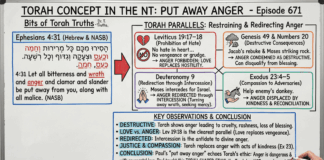In this week’s reading the people were very discontented saying the following, ויהי העם כמתאננים רע באזני יהוה וישמע יהוה ויחר אפו ותבער־בם אש יהוה ותאכל בקצה המחנה 11:1 The people took to complaining bitterly before the LORD. The LORD heard and was incensed: a fire of the LORD broke out against them, ravaging the outskirts of the camp. ויצעק העם אל־משה ויתפלל משה אל־יהוה ותשקע האש 11:2 The people cried out to Moses. Moses prayed to the LORD, and the fire died down. ויקרא שם־המקום ההוא תבערה כי־בערה בם אש יהוה 11:3 That place was named Taberah, because a fire of the LORD had broken out against them. והאספסף אשר בקרבו התאוו תאוה וישבו ויבכו גם בני ישראל ויאמרו מי יאכלנו בשר 11:4 The riffraff in their midst felt a gluttonous craving; and then the Israelites wept and said, “If only we had meat to eat! זכרנו את־הדגה אשר־נאכל במצרים חנם את הקשאים ואת האבטחים ואת־החציר ואת־הבצלים ואת־השומים 11:5 We remember the fish that we used to eat free in Egypt, the cucumbers, the melons, the leeks, the onions, and the garlic. ועתה נפשנו יבשה אין כל בלתי אל־המן עינינו 11:6 Now our gullets (נפשנו) are shriveled. There is nothing at all! Nothing but this manna to look to!” והמן כזרע־גד הוא ועינו כעין הבדלח 11:7 Now the manna was like coriander seed, and in color it was like bdellium. שטו העם ולקטו וטחנו ברחים או דכו במדכה ובשלו בפרור ועשו אתו עגות והיה טעמו כטעם לשד השמן 11:8 The people would go about and gather it, grind it between millstones or pound it in a mortar, boil it in a pot, and make it into cakes. It tasted like rich cream. וברדת הטל על־המחנה לילה ירד המן עליו 11:9 When the dew fell on the camp at night, the manna would fall upon it. וישמע משה את־העם בכה למשפחתיו איש לפתח אהלו ויחר־אף יהוה מאד ובעיני משה רע 11:10 Moses heard the people weeping, every clan apart, each person at the entrance of his tent. The LORD was very angry, and Moses was distressed. It is interesting how the Scriptures say that “the fire broke out against them ravaging at the outskirts of the camp.” Note how the people mingled with the nations while they were wandering in the wilderness (see Parashat Pinchas). This draws in the context of “near and far” in relation to the people in their nearness to the Lord who is at the center of the camp (at the Mishchan [Tabernacle]). Could a conclusion be drawn, those who are near have greater faith than those who are far? This could be analogized to those who sit at the feet of their rabbi (going to the front of the synagogue) as opposed to those who pop in and sit in the back? It could be those who were in the outskirts of the camp did not have a proper view of the Lord God Almighty and fell into sin in their hearts leading to the intense and bitter complaining before God? Could it also be those who were at the outskirts of the camp were the ones who would sneak off to mingle with the nations? The people say, ו וְעַתָּה נַפְשֵׁנוּ יְבֵשָׁה אֵין כֹּל בִּלְתִּי אֶל-הַמָּן עֵינֵינוּ: 11:6 Now our gullets are shriveled. There is nothing at all! Nothing but this manna to look to!” Note how “gullets” is the word נַפְשֵׁנוּ meaning “our souls.” the people are saying this food isn’t enough, the Lord God Almighty isn’t enough, even our souls are shriveled, dried up, and as dead people. The people were not just complaining about the food. Their complaint had a much deeper spiritual component. Rashi has a similar interpretation in his commentary on Bamidbar / Numbers 11:1 Part 2 states the following, “כְּמִתְאֹנֲנִים — The term מִתְאֹנֲנִים denotes [people who seek] “a pretext” — they seek a pretext how to separate themselves from following the Omnipresent. Similarly is stated in the narrative of Samson, (Judges 14:4) “for he sought a pretext (תואנה) [against the Philistines]” (Sifrei Bamidbar 85).” This pretext is designed to find a reason to be discontented and this was evil in the sight of God. Daat Zkenim on Bamidbar / Numbers 11:1 Part 1 states, “וַיְהִי הָעָם כְּמִתְאֹנֲנִים, “the people were like murmurers;” the people were already mourning the potential casualties they would incur when going into battle against the Canaanites in order to conquer their land. They were lacking in faith and dreading warfare.” This interpretation states the people were seeking reasons to be discontented and this was connected to their lack of faith and their expectation of war on entering the Promised Land. The idea is instead of marching joyfully towards their destination, the Holy Land, being delivered from bondage, being set free from slavery, they marched grudgingly. This is why in the verse, , וַיְהִי הָעָם כְּמִתְאֹנֲנִים רַע בְּאָזְנֵי יְהוָֹה וַיִּשְׁמַע יְהוָֹה וַיִּחַר אַפּוֹ וַתִּבְעַר-בָּם אֵשׁ יְהֹוָה וַתֹּאכַל בִּקְצֵה הַמַּחֲנֶה: 11:1 The people took to complaining bitterly before the LORD. The LORD heard and was incensed: a fire of the LORD broke out against them, ravaging the outskirts of the camp, the reason the word כְּמִתְאֹנֲנִים is spelled with the prefix כ (a preposition describing something in relative terms, i.e. “as if”) is because at this point in the journey they did not yet dare verbalize their feelings of discontent. They did not want Moses to hear their complaint. This is why the Torah describes God as “hearing” unspoken complaints by the people. As we go through life living out our faith, are we doing the same thing the people here were doing? Ibn Ezra explained, “It is the same language as ‘evil,’ like it is used in the phrase ‘your evil thoughts’ (Jeremiah 4:14)…that is, they spoke evil words.” Discontentment can lead to evil thoughts, and these thoughts are known by the Lord God in heaven. This week’s Torah portion speaks to us of not just remaining faithful before God, but of the importance of not joining ourselves to the ways of the nations, and to being joyful before the Lord for such a great salvation He has provided!
Home Bits of Torah Truth Bits of Torah Truths, פרשת בהעלתך, Parashat Behaalotcha, Unrepentant Disobedience to God’s...









